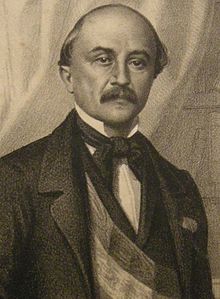Luigi Carlo Farini
| Luigi Carlo Farini | |
|---|---|
 |
|
| 4th Prime Minister of Italy | |
|
In office 8 December 1862 – 24 March 1863 |
|
| Monarch | Victor Emmanuel II |
| Preceded by | Urbano Rattazzi |
| Succeeded by | Marco Minghetti |
| Personal details | |
| Born |
22 October 1812 Russi |
| Died | 1 August 1866 (aged 53) Quarto dei Mille near Genoa |
| Political party | Historical Right |
Luigi Carlo Farini (22 October 1812 – 1 August 1866) was an Italian physician, statesman and historian.
Farini was born at Russi, in what is now the province of Ravenna.
After completing a brilliant university course at Bologna, which he interrupted to take part in the revolution of 1831, he practised as a physician at Russi and at Ravenna. He acquired a considerable reputation, but in 1843 his political opinions brought him under the suspicion of the police and caused his expulsion from the papal states. He resided successively in Florence and Paris, and travelled about Europe as private physician to Prince Jérôme Bonaparte, but when Pius IX was elected to the Holy See and began his reign with apparently Liberal and nationalist tendencies, Farini returned to Italy and was appointed secretary-general to G Recchi, the minister of the interior (March 1848).
But he held office for little more than a month, since like all the other Italian Liberals he disapproved of the Pius IX's change of front in refusing to allow his troops to fight against Austria, and resigned with the rest of the ministry on 29 April. Pius, wishing to counteract the effect of this policy, sent Farini to Charles Albert, king of Sardinia, to hand over the command of the papal contingent to him. Elected member of parliament for Faenza, he was again appointed secretary to the ministry of the interior in the Mamiani cabinet, and later director-general of the public health department.
He resigned office on the proclamation of the republic after the flight of the pope to Gaeta in 1849, resumed it for a while when Pius returned to Rome with the protection of French arms, but when a reactionary and priestly policy was instituted, he went into exile and took up his residence at Turin. There he became convinced that it was only through the House of Savoy that Italy could be liberated, and he expounded his views in Cavour's paper Il Risorgimento, in La Frusta and Il Piemonte, of which latter he was at one time editor. He also wrote his chief historical work, Lo Stato Romano dal 1815 al 1850, in four volumes (Turin, 1850).
...
Wikipedia
